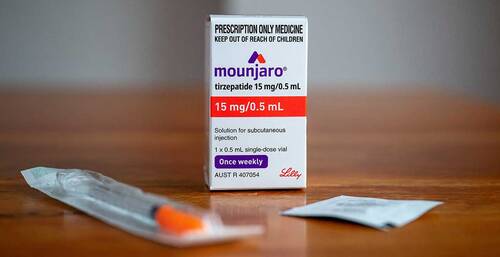
09 Sep Understanding Tirzepatide Side Effects: Key Insights
Tirzepatide is an innovative medication recently making waves in the treatment of type 2 diabetes and obesity. Known by its brand names, Mounjaro and Zepbound, this medication is a dual glucose-dependent insulinotropic polypeptide (GIP) and glucagon-like peptide-1 (GLP-1) receptor agonist.
While its efficacy in managing blood glucose levels and supporting weight loss is noteworthy, it’s crucial for patients and healthcare providers to fully understand the potential side effects associated with tirzepatide.
This article delves into the detailed aspects of tirzepatide side effects, providing key insights for those considering this medication.

What is Tirzepatide?
Tirzepatide belongs to a new class of medications designed to manage blood sugar in adults with type 2 diabetes. It works by mimicking the action of two incretin hormones—GIP and GLP-1—which help regulate insulin secretion, slow down gastric emptying, and reduce appetite.
These combined effects make tirzepatide particularly effective for controlling blood sugar levels and promoting weight loss, making it a dual-action treatment option.
Common Side Effects of Tirzepatide
As with many medications, tirzepatide comes with a range of potential side effects. While not everyone will experience these adverse effects, it’s important to be aware of them so you can recognize and manage any issues that may arise.
1. Gastrointestinal Issues
One of the most commonly reported tirzepatide side effects involves the gastrointestinal (GI) system. This can include:
- Nausea: This is one of the most frequent side effects, particularly when starting the medication or increasing the dosage. It usually diminishes as the body adjusts to the treatment.
- Diarrhea: Patients may experience loose stools or frequent bowel movements, which can be uncomfortable and sometimes lead to dehydration if not managed properly.
- Vomiting: Although less common, some individuals may experience vomiting, especially if the nausea is severe.
- Abdominal Pain: Some patients report a general discomfort or cramping in the abdominal area, which can range from mild to moderate in intensity.
These gastrointestinal symptoms are typically mild to moderate and often improve over time. However, if they persist or become severe, it’s essential to consult with a healthcare provider.
2. Hypoglycemia
Hypoglycemia, or low blood sugar, is a potential side effect of tirzepatide, particularly when it is used in combination with other diabetes medications, such as insulin or sulfonylureas. Symptoms of hypoglycemia include:
- Shakiness
- Dizziness
- Sweating
- Confusion
- Irritability
- Rapid heartbeat
Severe hypoglycemia can be dangerous and requires immediate attention. To minimize the risk, patients should monitor their blood sugar levels regularly and discuss any adjustments to their medication regimen with their healthcare provider.
3. Decreased Appetite
While a decrease in appetite can be beneficial for those seeking weight loss, it is still considered one of the tirzepatide side effects. The reduction in hunger can lead to reduced food intake, which, while helping with weight management, may also cause fatigue or nutritional deficiencies if not monitored closely.
4. Injection Site Reactions
As tirzepatide is administered via injection, some patients may experience reactions at the injection site. These reactions are usually mild and include:
- Redness
- Swelling
- Itching
- Tenderness
These symptoms generally resolve on their own within a few days. To reduce the likelihood of these reactions, it’s recommended to rotate the injection sites regularly.

Serious Side Effects of Tirzepatide
While the above side effects are more common and often manageable, tirzepatide also carries the risk of more serious side effects. These require immediate medical attention and should be discussed thoroughly with a healthcare provider before starting the medication.
1. Pancreatitis
Pancreatitis, or inflammation of the pancreas, is a rare but serious side effect associated with tirzepatide. Symptoms of pancreatitis include:
- Severe abdominal pain that may radiate to the back
- Persistent nausea and vomiting
- Fever
- Increased heart rate
If pancreatitis is suspected, it is crucial to stop the medication immediately and seek medical attention. This condition can be life-threatening if not treated promptly.
2. Thyroid Tumors
Animal studies have shown that tirzepatide can cause thyroid C-cell tumors. While this has not been conclusively proven in humans, the FDA has issued a warning for the potential risk. Patients should be aware of symptoms indicative of thyroid tumors, such as:
- A lump in the neck
- Hoarseness
- Difficulty swallowing
- Persistent cough
It is essential for patients with a personal or family history of medullary thyroid carcinoma (MTC) or Multiple Endocrine Neoplasia syndrome type 2 (MEN 2) to avoid using tirzepatide.
3. Gallbladder Disease
Tirzepatide has been linked to an increased risk of gallbladder disease, including gallstones (cholelithiasis) and inflammation of the gallbladder (cholecystitis). Symptoms to watch for include:
- Severe pain in the upper right abdomen
- Nausea and vomiting
- Fever
- Jaundice (yellowing of the skin and eyes)
If any of these symptoms occur, it is important to seek medical attention promptly.
4. Kidney Problems
There have been reports of kidney issues, including acute kidney injury, in patients using tirzepatide, particularly those who have experienced severe dehydration from gastrointestinal side effects like vomiting or diarrhea. Symptoms of kidney problems include:
- Decreased urine output
- Swelling in the legs or ankles
- Fatigue
- Confusion
Monitoring kidney function is important during treatment, especially for those with pre-existing kidney conditions.
Managing Tirzepatide Side Effects
Understanding how to manage tirzepatide side effects can help patients continue their treatment with fewer disruptions. Here are some strategies for managing common and serious side effects:
- Dietary Adjustments: Eating smaller, more frequent meals and avoiding fatty or spicy foods can help reduce nausea and vomiting.
- Hydration: Staying well-hydrated can help manage diarrhea and prevent dehydration.
- Over-the-counter Medications: In some cases, over-the-counter remedies may help manage mild gastrointestinal symptoms, but it’s important to consult with a healthcare provider before taking additional medications.
- Blood Sugar Monitoring: Regularly checking blood glucose levels, especially when adjusting doses or combining tirzepatide with other diabetes medications, is crucial.
- Carbohydrate Intake: Keeping a source of fast-acting carbohydrates, like glucose tablets or juice, on hand can quickly address low blood sugar episodes.
- Medical Alert Bracelet: Wearing a medical alert bracelet can inform others of the risk of hypoglycemia in case of an emergency.
- Proper Technique: Ensuring that the injection is administered correctly can reduce the likelihood of site reactions. It’s important to follow the instructions provided by a healthcare provider.
- Site Rotation: Rotating injection sites helps prevent irritation and reduces the risk of adverse reactions in any one area.
- Regular Check-ups: Frequent medical check-ups, including blood tests and imaging, can help detect any early signs of serious side effects.
- Prompt Reporting: Patients should report any unusual symptoms or concerns to their healthcare provider immediately to address potential issues before they become severe.
Weighing the Benefits and Risks of Tirzepatide
The decision to use tirzepatide should be made after carefully considering the potential benefits and risks. While the medication has shown significant benefits in managing type 2 diabetes and promoting weight loss, it’s crucial to balance these against the possible side effects.
Benefits of Tirzepatide
1. Effective Glycemic Control
Tirzepatide has been proven to effectively lower HbA1c levels, a key marker of long-term blood glucose control. This can help reduce the risk of diabetes-related complications such as neuropathy, retinopathy, and cardiovascular disease.
2. Weight Loss
One of the standout benefits of tirzepatide is its ability to promote significant weight loss, which is particularly beneficial for patients with type 2 diabetes, as excess weight is a major risk factor for the condition.
3. Convenience
Tirzepatide is administered once weekly, which can be more convenient for patients compared to daily medications. This can improve adherence and overall treatment outcomes.
Risks of Tirzepatide
1. Gastrointestinal Discomfort
As discussed, gastrointestinal side effects are among the most common tirzepatide side effects. While they are often manageable, they can be a significant burden for some patients.
2. Potential for Serious Side Effects
The risk of pancreatitis, thyroid tumors, gallbladder disease, and kidney problems, although rare, are serious concerns that must be weighed against the benefits of the medication.
3. Cost
As a relatively new medication, tirzepatide can be expensive, and not all insurance plans may cover it. The cost may be prohibitive for some patients, limiting access to this treatment option.
Who Should Consider Tirzepatide?
Tirzepatide may be an excellent option for individuals with type 2 diabetes who have not achieved adequate glycemic control with other medications. It is particularly beneficial for those who are also struggling with obesity, as the weight loss effects can provide additional health benefits.
However, tirzepatide is not suitable for everyone. Patients with a history of pancreatitis, thyroid cancer, or gallbladder disease, as well as those with significant kidney issues, should discuss alternative treatment options with their healthcare provider.
Additionally, those who are pregnant, planning to become pregnant, or breastfeeding should avoid using tirzepatide due to the lack of data on its safety in these populations.
Conclusion
Understanding tirzepatide side effects is crucial for anyone considering this medication as part of their diabetes management plan. While the benefits, including improved glycemic control and weight loss, are substantial, it’s important to remain vigilant about the potential risks.
Patients should engage in open discussions with their healthcare providers, weighing the pros and cons based on their individual health status and treatment goals. Regular monitoring and proactive management of any side effects can help ensure that the benefits of tirzepatide outweigh the risks, leading to better overall health outcomes.
As tirzepatide continues to be studied and used in broader populations, our understanding of its side effects will likely evolve. Staying informed and maintaining a close relationship with a healthcare provider will help patients navigate their treatment journey with confidence.

Frequently Asked Questions
How long do tirzepatide side effects typically last?
The duration of side effects from tirzepatide can vary depending on the individual and the specific side effect. Common side effects like nausea or diarrhea often occur shortly after starting the medication or increasing the dose, and they usually improve within a few days to weeks as the body adjusts. However, if side effects persist or worsen over time, it is important to consult with a healthcare provider.
Can tirzepatide cause weight loss, and is this considered a side effect?
Yes, tirzepatide can cause significant weight loss, which is often seen as a beneficial effect, particularly for individuals with type 2 diabetes who are overweight. However, in some cases, the reduction in appetite and subsequent weight loss can be excessive, leading to concerns about undernutrition or fatigue. Patients should monitor their weight and discuss any rapid or unintentional weight loss with their healthcare provider.
Is there a risk of allergic reactions with tirzepatide?
Although rare, allergic reactions to tirzepatide can occur. Symptoms of an allergic reaction may include rash, itching, swelling (especially of the face, tongue, or throat), severe dizziness, or difficulty breathing. If any of these symptoms occur, it is crucial to seek immediate medical attention. Patients should inform their healthcare provider of any known allergies before starting tirzepatide.
How does tirzepatide affect the liver, and should liver function be monitored?
Tirzepatide has not been extensively linked to liver damage in clinical studies, but as with any medication that affects metabolic processes, it’s advisable to monitor liver function, especially in patients with pre-existing liver conditions. Routine blood tests may be recommended by healthcare providers to ensure that liver enzymes remain within a healthy range during treatment.
Can tirzepatide impact mental health or mood?
Some patients have reported experiencing changes in mood or mental health while taking tirzepatide, including feelings of depression or anxiety. While these effects are not common, they should not be overlooked. Patients experiencing mood changes should discuss them with their healthcare provider, as adjustments to the treatment plan may be necessary.
Sources
Lin, F., Yu, B., Ling, B., Lv, G., Shang, H., Zhao, X., Jie, X., Chen, J., & Li, Y. (2023). Weight loss efficiency and safety of tirzepatide: A Systematic review. PLoS ONE, 18(5), e0285197. https://doi.org/10.1371/journal.pone.0285197
Eli Lilly and Company. (2023). Prescribing Information of Mounjaro. Retrieved from https://uspl.lilly.com/mounjaro/mounjaro.html
Knudsen, L. B., Madsen, L. W., Andersen, S., Almholt, K., De Boer, A. S., Drucker, D. J., Gotfredsen, C., Egerod, F. L., Hegelund, A. C., Jacobsen, H., Jacobsen, S. D., Moses, A. C., Mølck, A., Nielsen, H. S., Nowak, J., Solberg, H., Thi, T. D. L., & Zdravkovic, M. (2010). Glucagon-Like peptide-1 receptor agonists activate rodent thyroid C-Cells causing calcitonin release and C-Cell proliferation. Endocrinology, 151(4), 1473–1486. https://doi.org/10.1210/en.2009-1272
The information on MedicalResearch.com is provided for educational purposes only, and is in no way intended to diagnose, cure, or treat any medical or other condition.
Some links may be sponsored. Products above are not warranted or endorsed.
Always seek the advice of your physician or other qualified health and ask your doctor any questions you may have regarding a medical condition. In addition to all other limitations and disclaimers in this agreement, service provider and its third party providers disclaim any liability or loss in connection with the content provided on this website.
Last Updated on September 17, 2024 by Marie Benz MD FAAD
